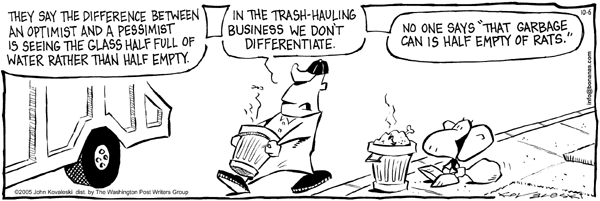scalar adjectives with arguments
Here's a cartoon with a grammaticality judgment as the punchline:

Funny thing is, I concur: 'half empty' can't take an internal argument, although 'empty' certainly can ('empty of meaning', e.g.). 'Half empty' is also clearly fine. 'Half full' is of course fine, and 'half full' can of course take a internal argument. Here's some Google searches which bear out this judgment:
Ghit ratio: 'full':'empty'
1,980,000,000: 133,000,000 (approx 15:1)
Ghit ratio: 'half full':'half empty'
2,070,000: 1,810,000 (approx 1:1)
Ghit ratio: 'half full of':'half empty of"
247,000: 1660 (approx 149:1)
Indeed, about a third of those 'half empty of' cases seem to be typos for 'half empty or half full'; the Ghit return for "half empty of" -"half empty of half full" is only 1080, so the real ratio is more like 247:1. (Note that if you weed out the "half full of water" cases, to avoid that one expression about the glass being half empty or half full of water, you still have 188,000 hits for "half full of", so the ratio's still about 188:1.
Anyway, I don't need Google to tell me that 'half empty of X' is way worse than 'half full of X', but that the difference between 'empty of X' and 'full of X', although sensable, isn't of the same grade at all.
Whyzat?
Update: Mark Lieberman at Language Log has pursued this problem considerably farther, in the context of comparing search results between engines and reliable linguistic corpora, and has lots of interesting remarks to make and examples to exhibit. Among other things, he looked even closer at the sixteen hundred or so results for 'half empty of' and finds that not only are those typos mentioned above inflating the numbers, so are hits for strings that match superficially but have significantly different structures, such as "Only the most 'glass half empty' of HR professionals would...". Nonetheless, a few examples of 'half empty' with an internal argument that seem to be both naturally produced and easily interpretable did turn up. I don't myself find them particularly grammatical, despite their clarity, though the tide of opinion (3 votes for to mine against) seems to be against me here.
I should also note that the GoogleFight ratios that I reported above are slightly different than the results you would get if you just typed the strings straight into Google; mostly the Ghit results are a little higher. I don't know why that is, unless GoogleFight is plugged into an older/newer version of Google that is not obvious from their main website.

4 Comments:
To me, the difference feels like a pragmatic one rather than a strictly grammatical one. The contexts in which I would use half empty are mostly ones in which the container being described is expected to be full, or was recently full and has been partially emptied, and in such contexts the identity of the (expected) contents of the container is likely to be already known, and thus not to need to be specified.
What makes This garbage can is half empty of rats something that no one would say is that no one wants (or even expects) a garbage can to be full of rats. One does expect a garbage can to be full of garbage, and one might complain about people setting out garbage cans (or, better, recycling bins, since recyclables don't rot) half empty instead of waiting until they had a full load. And in that context, half empty of garbage seems (to me, anyway) prolix or redundant rather than ungrammatical.
really? huh! For me, 'half empty of garbage' is pretty bad, as is 'the glass is half empty of water' -- pragmatic plausibility doesn't help me at all. Indeed, the crucial contrast for me is between
'The glass is empty of water'
(which is fine)
and
'*The glass is half empty of water'
(which is seriously degraded for me)
I actually now vaguely wonder whether chris kennedy may have discussed this type of fact as a kind of Gricean effect, though, in that negative scales behave differently from positive scales in their presuppositions... or something. Seems to me that coz 'empty' is describing how much of a container contains *nothing*, then it shouldn't take an object... but it shouldn't take one at all, not just when modified by a portioning element like 'half'...
hmm! very interesting.
...wonder if this could be related to the fact that "be 30% likely to" doesn't seem to allow reconstruction of its subject into its complement clause, unlike "be likely to"--which has sometimes been taken as evidence that "be 30% likely to" has to be a control rather than a raising predicate. Don't see how to relate these facts, at the moment, but hey, it's 2:40 am (no matter what the time stamp at the bottom says!). Time for bed.
--noo
I'm with the Q on this one. Consider especially the results you get on google with "more|mostly empty of," where the comparative modifiers entail either some other container, or (importantly for us) the same container at a different time.
As is well known (I think), the negation of X evokes X (as in when told "don't think of an elephant"). It thus makes perfect sense that to describe a container as lacking contents X, it is likely that the container would/should/will have X in it. Reverse this, and you get felicity conditions - if something wasn't (partways) full of X at some point in the past, it's a smidge disingenuous to talk about it as empty of X.
Also, I don't think empty talks exclusively about how much of a container is occupied by -nothing-, at least in an absolute sense. Just check google for "full of * but empty of" (and yes, there are a lot of metaphorical uses).
Post a Comment
<< Home